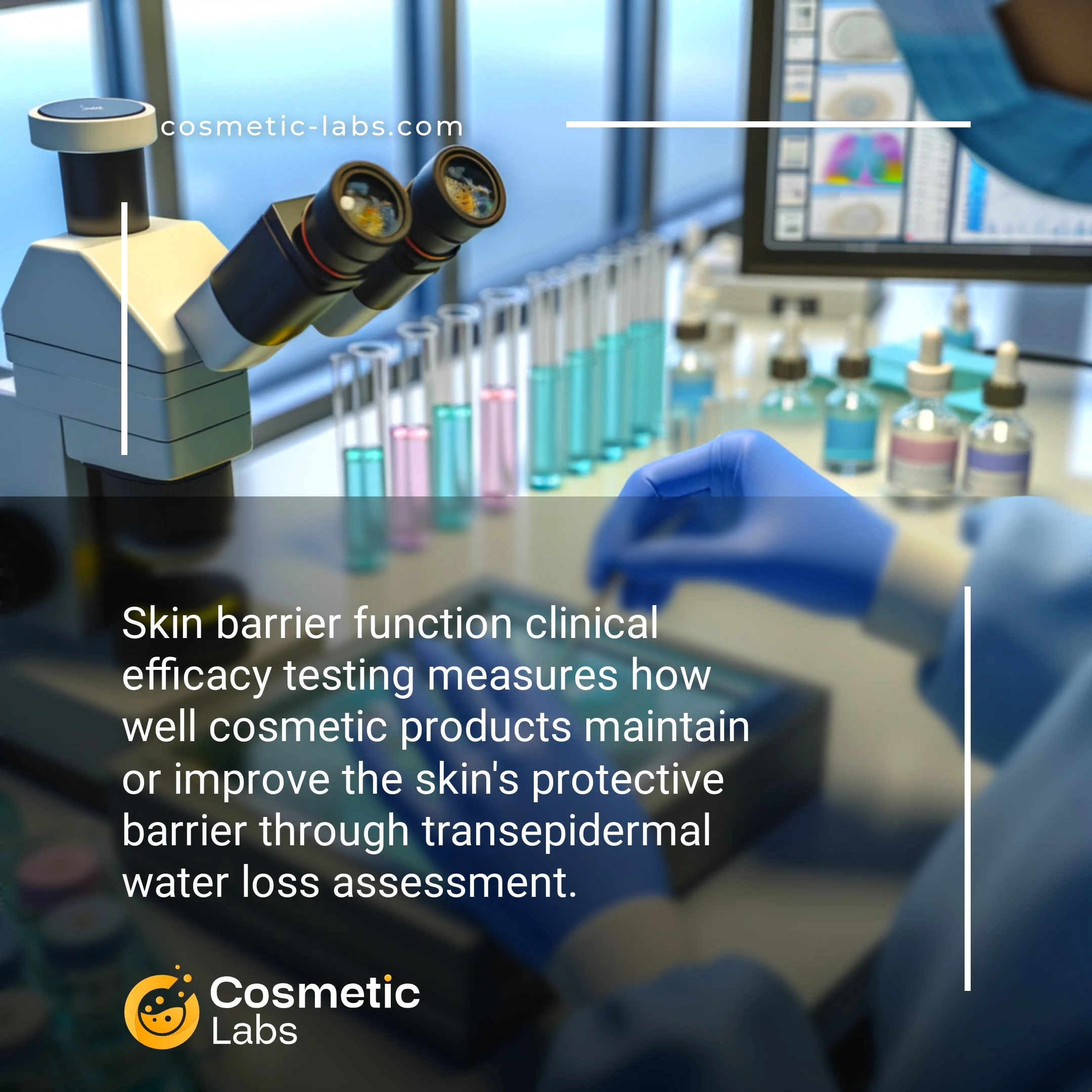Skin Barrier Testing Services for Cosmetic Brands

What is Skin barrier function efficacy testing?
Skin barrier function clinical efficacy testing services measure how well cosmetic products protect and restore the skin’s natural protective layer through controlled studies on human volunteers. These tests use transepidermal water loss (TEWL) measurements and corneometry to quantify barrier repair, hydration retention, and irritation potential over specific timeframes. Labs conduct these studies to provide brands with scientific proof that their moisturizers, serums, and treatments actually strengthen skin barrier integrity—data that’s increasingly important for regulatory compliance and consumer trust in today’s beauty market.
Why do you need this service?
Cosmetic labs conduct transepidermal water loss (TEWL) measurements to validate moisturizer and barrier repair claims for product launches. Teams submit formulations containing ceramides, hyaluronic acid, or peptides for 28-day studies that measure skin hydration levels and barrier integrity. These tests generate regulatory-compliant data that supports marketing claims like “restores skin barrier function” or “reduces moisture loss by 40%” – documentation you’ll need for FDA submissions and consumer confidence.
Who provides Skin barrier function efficacy testing services?
All cosmetic labs providing Skin barrier function efficacy testing services
There is no company providing these services at the moment.
Skin Barrier Function Clinical Efficacy Testing Services
Labs on our platform run skin barrier function clinical efficacy testing to validate your product’s protective and restorative claims. These studies measure transepidermal water loss (TEWL), stratum corneum hydration, and barrier recovery rates using standardized protocols that regulatory bodies accept.
Barrier Integrity Measurement Protocols
Testing facilities use corneometry and evaporimetry to quantify barrier performance before and after product application. The standard protocol involves controlled environmental conditions with humidity levels between 40-60% and temperatures at 20-22°C.
Key measurements include:
- TEWL values (g/m²/h) at baseline and post-treatment
- Skin hydration levels using electrical capacitance
- Barrier recovery time after tape stripping
- pH measurements to assess acid mantle function
Clinical Study Design and Validation
Labs design studies with 20-40 participants over 2-8 week periods, depending on your product’s intended use. They follow ICH-GCP guidelines and use split-face or randomized controlled designs to minimize bias.
Standard protocols test products against placebo controls and measure statistical significance using paired t-tests. Labs provide detailed reports with individual data points, statistical analysis, and regulatory-compliant documentation for your marketing claims.
Connect with specialized labs on our platform to discuss your barrier function testing requirements and timeline expectations.
Practical Applications of Skin Barrier Function Clinical Efficacy Testing
Cosmetic labs use skin barrier function clinical efficacy testing to validate product claims and meet regulatory requirements across multiple beauty categories.
Anti-Aging and Moisturizing Product Validation
Labs measure transepidermal water loss (TEWL) using instruments like the Tewameter TM 300 to quantify barrier repair capabilities. Testing protocols typically run 4-8 weeks with 20-30 participants to establish statistical significance. Product developers use these measurements to support claims about barrier strengthening and moisture retention.
Corneometer readings complement TEWL data by measuring skin hydration levels at specific timepoints. Labs document improvements ranging from 15-40% in barrier function metrics, providing the evidence needed for marketing claims and regulatory submissions.
Sensitive Skin and Dermatitis Treatment Formulations
Clinical testing for sensitive skin products focuses on barrier recovery after controlled irritation using SLS patch tests. Labs track inflammatory markers and barrier restoration over 72-hour periods using non-invasive bioengineering methods. This approach validates gentle formulations and barrier repair ingredients like ceramides and niacinamide.
Dermatological testing protocols include pH measurements, sebum analysis, and visual scoring by trained evaluators. These comprehensive assessments help brands substantiate therapeutic claims while ensuring product safety for compromised skin conditions.
| Testing Method | Measurement Focus | Typical Timeline | Key Applications |
|---|---|---|---|
| TEWL Analysis | Water loss rate | 4-8 weeks | Moisturizers, anti-aging |
| Corneometry | Hydration levels | 2-4 weeks | Hydrating serums, creams |
| SLS Patch Testing | Irritation response | 72 hours | Sensitive skin products |
| pH Monitoring | Skin surface pH | 1-2 weeks | Cleansers, treatments |
Ready to validate your formulation’s barrier function claims? Connect with experienced cosmetic labs on our platform to discuss your specific testing requirements and timeline.
